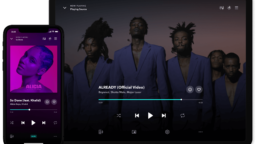2018 was a particularly headline-worthy 12 months for TIDAL.
It was a year when the Jay-Z-founded streaming company was accused of faking streams – a claim it strongly denied. That story ultimately led to the platform literally threatening to sue the country of Norway.
Back on planet earth, TIDAL was still a functioning business in 2018 – one co-owned by US telco Sprint and, it transpires, one which employed 238 people.
That latter stat is just one nugget disclosed by newly-published documents, obtained by MBW, which reveal the financial performance of TIDAL parent Project Panther Bidco (PPB) in calendar 2018.
The PPB docs, filed with UK Companies House last week, reveal some interesting facts about TIDAL’s business as we stand today in 2020. For starters, the company says it has over 60 million tracks (and 250,000 “high quality” videos) in its licensed library.
Highlighting the tyranny of the streaming age: If an average song lasts three minutes, those 60 million tracks would take you 3 million hours, or 125,000 days, or 342 years, to listen through back-to-back.

The PPB document also reveals that TIDAL currently “offers unlimited music streaming subscription services in 54 countries worldwide”, while reiterating that the company is “an artist-owned global music and entertainment platform”.
You may remember that, following Project Panther Bidco / Jay-Z’s acquisition of Nordic service Aspiro for €50m in 2015, the platform relaunched as TIDAL with an array of superstar backers, each of whom reportedly got a 3% equity stake in the refreshed business.
Their ranks included the likes of Rihanna, Madonna, Nicki Minaj, Beyoncé, Daft Punk, Coldplay, Kanye West and Jason Aldean. (West later publicly claimed that TIDAL owed him $3m in unpaid fees.)
In terms of financials, TIDAL generated $147.6m in calendar 2018, according to PPB’s filing.
That was up 26.4% on the $116.8m the company posted in the prior year. Gross profit was up too, at $44.7m, rising 29.6% YoY.
These increases, according to the filing, were achieved despite TIDAL’s annual revenues within the United States falling in 2018, down 19.7% YoY – or by just over $14m – to $57.4m.
[UPDATE: A TIDAL representative has told MBW that US subscribers and underlying revenue were actually up at the company in calendar year 2018 – but that due to “internal financial structures”, this was not reflected in the PPB filing.]
TIDAL’s annual revenues in territories outside the US and UK rose considerably in 2018 – more than doubling to $84.5m. (Significantly, the company expanded into Africa in August 2018, via a partnership with telco operator MTN. PPB’s filing also says it expanded in Europe and Latin America via telco deals in the year.)
TIDAL’s operating loss in 2018 stood at $36.7m, with its net loss weighing in at $36.9m.
Both of these figures improved / narrowed versus 2017, when TIDAL’s operating loss was $40.6m and its net loss was $40.3m (see below).


Other interesting stats about TIDAL’s 2018 includes the fact that some 97.7% of its revenues came from subscriptions ($144.3m), with a further $3.4m coming from sponsorship. (Unlike Spotify, TIDAL doesn’t operate an ad-supported ‘free’ tier; instead, it offers would-be customers a month’s free trial for 30 or 60 day periods.)
Some 38.9% of TIDAL’s 2018 revenues came from the United States, down on the 61.2% share the US claimed in the prior year.

As mentioned, Project Panther Bidco, whose operating HQ is in New York City, employed an average of 238 employees in 2018, up on the 209 it counted in the prior year.

In addition to its audio tracks and videos, TIDAL offers its subscribers early access windows for live events, plus podcasts, “thousands of expertly curated playlists” and its own artist discovery platform, TIDAL Rising.
It’s $19.99-per-month TIDAL HiFi tier includes a range of Master Quality Authenticated (MQA) recordings.
In its 2018 filing, Project Panther Bidco noted: “During the year, the Group focused on driving revenue growth on the back of various investment and expansion initiatives, including exclusive content releases and new distribution deals with telecom carriers around the world, particularly in Western and Eastern Europe as well as Latin America.
“In the US, the Group expanded its commercial relationship with Sprint via their Unlimited plans which launched in 2018. This new plan is driving significant user and revenue growth in 2019.
“Additionally, the Group continues to invest in technological and marketing platforms, with significant enhancements to its product in the form of new user-friendly features (such as algorithmic mixes), new advanced sound capabilities and expanded performance-based growth and retention marketing.”Music Business Worldwide




